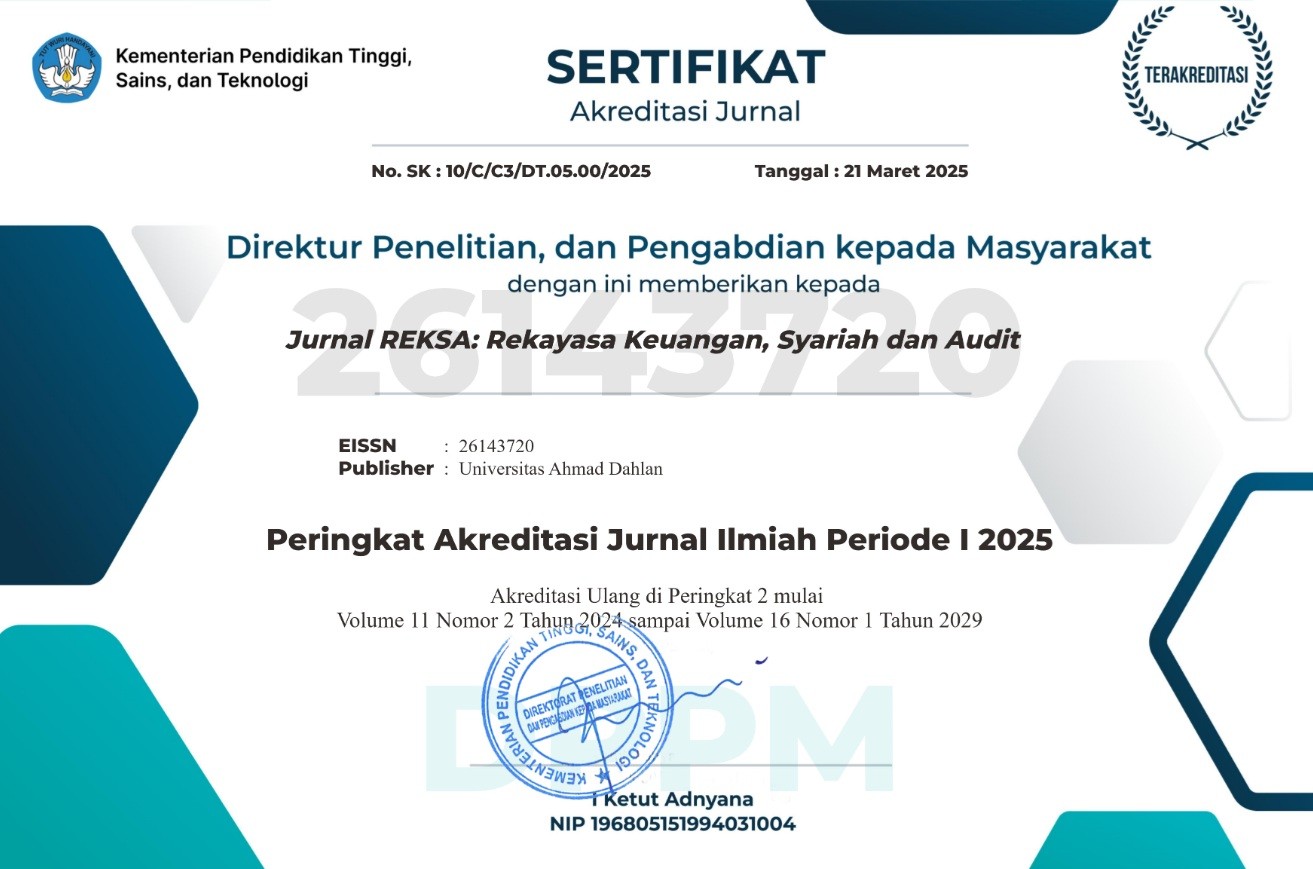Is Financial Management Mediating the Role of Love of Money and Human Resources Competence in Explaining MSMEs’ Performance?
DOI:
https://doi.org/10.12928/jreksa.v10i1.7392Keywords:
Financial management, Competence, love of money, MSMEAbstract
This study aims to analyze the role of financial management in mediating the impact of the love of money and human resource competence on MSMEs’ performance. It used primary data gathered from 143 respondents through a direct survey. The respondents were the owners of culinary MSMEs in the City of Jambi that were selected based on a cluster sampling method to represent all types of culinary MSMEs. Six hypotheses were formulated to achieve the aim of the study. Path analysis based on multiple regression and Sobel tests were applied to test the hypotheses. The analysis results show that human resource competence affects financial management and impacts MSMEs’ performance directly and indirectly. On the other hand, love of money did not impact financial management. It did not impact MSMEs’ performance either directly or indirectly. Thus, this study provides a piece of evidence for financial management as a mediating variable between human resources competence and MSMEs’ performance.
References
Agus, P., Setiawan, A., & Suarmanayasa, I. N. (2022). Pengaruh Literasi Keuangan dan Sikap Keuangan terhadap Pengelolaan Keuangan UMKM di Kecamatan Gerokgak pada Masa. 12(2), 501–508. Jurnal Ilmiah Akuntansi dan Humanika. https://doi.org/10.23887/jiah.v12i2.44783
Astungkara, A., & Widayanti, R. (2020). Peran Pendidikan Kewirausahaan Dan Love Of Money Terhadap Intensi Berwirausaha Pada Mahasiswa Akuntansi. Jurnal Akuntansi Dan Pajak, 20(2), 257–265.
Bastian, I. (2015). Akuntansi Sektor Publik: Suatu Pengantar.Penerbit Erlangga. Jakarta
Claudia, M., & Sangen, M. (2021). Pengaruh Kompetensi SDM, Kompetensi Wirausaha, Motivasi Berwirausaha Dan Niat Berwirausaha Terhadap Kinerja Usaha Kain Sasirangan Di Kotamadya Banjarmasin. Angewandte Chemie International Edition, 6(11), 951–952., 13(April), 15–38.
Dhamayantie, E., & Fauzan, R. (2017). Penguatan Karakteristik Dan Kompetensi Kewirausahaan Untuk Meningkatkan Kinerja UMKM Matrik : Jurnal Manajemen, Strategi Bisnis Dan Kewirausahaan, March 2018.
Dinas Koperasi dan UMKM .(2020).Rencana Strategis 2020-2024 Koperasi dan UMKM. Jakarta
Ghozali, I. (2018). Aplikasi Analisis Multivariate Dengan Program IBM SPSS 25 (IX). Badan Penerbit Universitas Dipenogoro.
Handoko. (2015). Manajemen Personalia dan Sumber Daya Manusia. BPFE Yogyakarta
Hanifawati, T., & Listyaningrum, R. S. (2021). Peningkatan Kinerja UMKM Selama Pandemi Covid-19 melalui Penerapan Inovasi Produk dan Pemasaran Online. Warta LPM, 24(3), 412–426.
Hery. (2015). Analisis Laporan Keuangan. Yogyakarta: CAPS (Center for Academic Publishing Service).
IAI. (2016). Exposure Draft Standar Akuntansi Keuangan Entitas Mikro, Kecil, dan Menengah. SAK EMKM Ikatan Akuntan Indonesia, 4, 1--54. http://iaiglobal.or.id/v03/files/draft_ed_sak_emkm_kompilasi.pdf
Icih, I. F., & Kurniawan, A. (2020). Pengaruh literasi keuangan, sikap love of money, aan pengetahuan paporan keuangan terhadap perilaku pengelolaan keuangan UMKM di wilayah kabupaten subang. Journal of Accounting for Sustainable Society, 02(01), 41–66.
Ilarrahmah, M. D., & Susanti. (2021). Pengaruh Kemampuan Menyusun Laporan Keuangan , Literasi Keuangan Dan Penggunaan Teknologi Informasi Terhadap Kinerja UMKM. Jurnal Pendidikan Ekonomi Dan Kewirausahaan, 5(1), 51–64.
Irfani, A. S. (2020). Manajemen Keuangan dan Bisnis : Teori dan Aplikasi. Gramedia Pustaka Utama.
Jatmiko, D. P.. (2017). Pengantar Manajemen Keuangan. Cetakan Pertama. Diandra Kreatif. Yogyakarta.
Locke, E. A. & Latham, G. P. (2002). A Theory of Goal Setting and Task Performance. Englewood Cliffs, NJ: Prentice-Hall.
Mulyawan, S. (2017). Manajemen Keuangan. Pustaka Setia. ISBN 978-979-076-512-2 .1-48. UIN Sunan Gunung Djati
Pakpahan, Y. E., & Gaol M. L. (2020). Analisis Kualitas Laporan Keuangan Dan Penggunaan Informasi Akuntansi Terhadap Kinerja UMKM Dengan Kompetensi Sebagai Pemoderasi. Jurnal Manajemen Bisnis Dan Kewirausahaan/Volume 4/No.6/November.Prakasa, Y., & Putri, Y. R. (2020). Iklim Kewirausahaan Dan Kompetensi Kewirausahaan: Upaya Untuk Meningkatkan Kinerja Usaha (Studi Pada UMKM Batik Tulis Bayat, Klaten). Jurnal Kewirausahaan Dan Bisnis, 25(2), 104.
Puspitaningtyas, Z. (2017). Pembudayaan Pengelolaan Keuangan Berbasis Akuntansi Bagi Pelaku Usaha Kecil Menengah. Jurnal Akuntansi, 21(3), 361.
Riyanto, B. (2013). Dasar-dasar Pembelanjaan Perusahaan. Edisi keempat. BPFE-Yogyakarta. Yogyakarta.
Risnaningsih, R. (2017). Pengelolaan Keuangan Usaha Mikro Dengan Economic Entity Concept. Jurnal Analisa Akuntansi Dan Perpajakan, 1(1), 41–50. https://doi.org/10.25139/jaap.v1i1.97
Saputra, K. A. K., Ekajayanti, L. G. P. S., & Anggiriawan, P. B. (2018). Kompetensi Sumber Daya Manusia Dan Sikap Love of Money Dalam Pengelolaan Keuangan Usaha Mikro Kecil Menengah (UMKM). Jurnal Reviu Akuntansi Dan Keuangan, 8(2), 135.
Spencer. (2007). Competence at work: Models for Superior Performance. Canada: John Wiley & Sons.
Suindari, N. M., & Juniariani, N. M. R. (2020). Pengelolaan Keuangan, Kompetensi Sumber Daya Manusia Dan Strategi Pemasaran Dalam Mengukur Kinerja Usaha Mikro Kecil Menengah (UMKM). KRISNA: Kumpulan Riset Akuntansi, 11(2), 148–154.
Tang, T. L. P., (1992). Meaning of money revisited. Journal of organizational behavior, vol. 13 no.1.
Widiani, N. P. (2019). The effect of love of money and emotional intelligence on employee performance with organizational citizenship behavior as mediating variable. International Research Journal of Engineering, IT & Scientific Research, 5(1), 39–49. https://doi.org/10.21744/irjeis.v5n1.596
Wicaksono, A. P., & Urumsah, D. (2016). Factors Influencing Employees to Commit Fraud in Workplace Empirical Study in Indonesian Hospitals. Asia Pacific Fraud Journal 1 (1): 1–18. https://doi.org/10.21532/apfj.001.16.01.01.01
Zainal, V. R. (2015). Manajemen Sumber Daya Manusia Untuk Perusahaan. Edisi ke-7. Depok: PT Rajagrafindo
Downloads
Published
How to Cite
Issue
Section
License
Copyright (c) 2023 Netty Herawaty

This work is licensed under a Creative Commons Attribution-ShareAlike 4.0 International License.
- Authors retain copyright and grant the JURNAL REKSA right of first publication with the work simultaneously licensed under a Creative Commons Attribution License (CC BY-SA 4.0) that allows others to share (copy and redistribute the material in any medium or format) and adapt (remix, transform, and build upon the material) the work for any purpose, even commercially with an acknowledgment of the work's authorship and initial publication in JURNAL REKSA.
- Authors are able to enter into separate, additional contractual arrangements for the non-exclusive distribution of the journal's published version of the work (e.g., post it to an institutional repository or publish it in a book), with an acknowledgment of its initial publication in JURNAL REKSA.
- Authors are permitted and encouraged to post their work online (e.g., in institutional repositories or on their website) prior to and during the submission process, as it can lead to productive exchanges, as well as earlier and greater citation of published work (See The Effect of Open Access).




